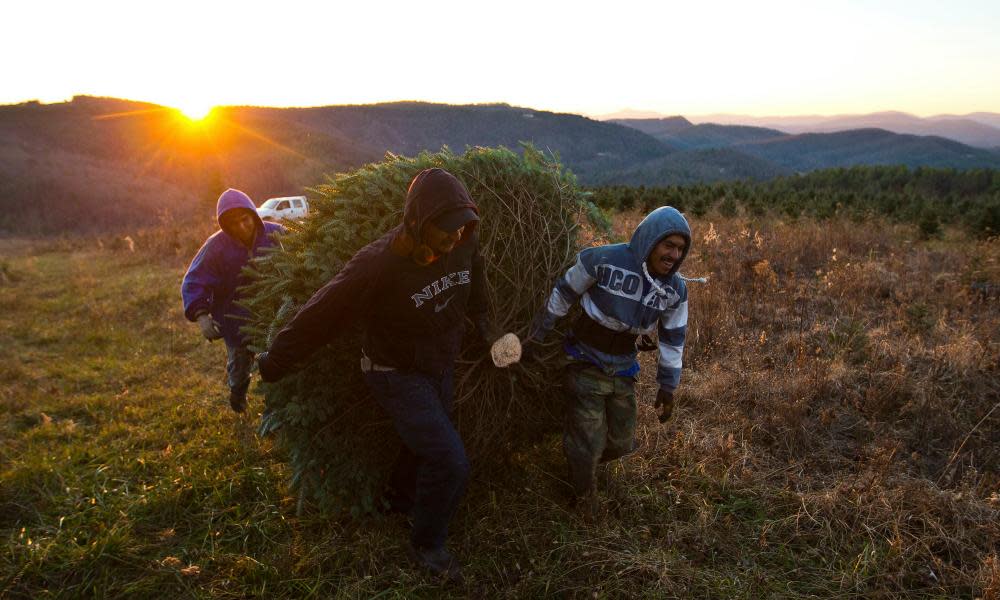Christmas tree cutters' labor fight shines light on holiday season's forgotten workers

As Americans gather around their Christmas tree, few think about the forgotten workers of the holiday season: the low-wage Latinos who toil in the fields cutting down trees and facing abuse, injury – and retaliation for speaking out.
In the mountains of North Carolina, workers at Hart-T-Tree farm in Grassy Creek say they had their wages stolen, were exposed to hazardous chemicals, and lived in constant fear of injury on the job. They also say they faced intimidating bosses pushing them to work harder in order to meet the holiday demands.
So they decided to organize to fight for their rights as members of the Farm Labor Organizing Committee – and won a $350,000 wage theft settlement against their employer.
The company acknowledged that mistakes were made and said they were being addressed. “We want to make it clear that we care about our workers and their safety has always been important to us,” a spokesman said.
The workers’ story is an inspiring one that is likely to encourage others in the industry. However, scared by their organizing efforts of over 10,000 unionized farm workers in North Carolina, Republicans in the North Carolina general assembly are attempting to making it more difficult for farm workers to unionize; putting the gains of workers in the mountains of North Carolina at risk.
Christmas tree work begins in March when workers begin planting trees.
Workers there say while they were planting trees, the farm owner was simultaneously spraying toxic chemicals like Dimethoate 400, a toxic herbicide used to kill mites and aphids. Chemical guidelines stipulate that farmers should wait for up to 10 days after spraying Dimethoate 400 before they let workers enter the fields. However, workers claim the owners of Hart-T-Tree farm made them keep planting only 50 to 100 yards away from where the chemicals were being dispersed.
Workers say they began immediately to get sick.
“The chemical made us have headaches, dizziness, vomit, and diarrhea. They were awful” said one worker, “Carlos”, who wished not to reveal his true name for fear of retaliation.
Workers who say they were forced to work under chemical exposure claim they were rarely given breaks to drink water and were forced to work 12 hours a day in sweltering heat.

“The people buying Christmas trees should know that it’s not easy to go out there in the heat when they don’t let you drink water,” said Carlos. “A few white people came here to work and they couldn’t take it. This is work being done entirely by Mexicans.”
Workers at the Hart-T-Tree also say they faced consistent pressure and abuse to work quicker.
“The grower was always right behind us, pressuring and criticizing your work,” said “Alejandro”, who also wished to remain anonymous out of fear of retaliation. “They would yell at you constantly. Many people quit.”
As the holiday season approaches and it comes time to cut down the trees, the workers say that this pressure grows even heavier, leading to injuries as they chop trees that can weigh 200lbs.
Instead of transporting the workers to the job site in trucks, which were available on Hart-T-Tree farm, workers say the owners forced them to ride on the top on a tractor bed full of trees being transported down windy mountain roads.
Workers complain that during the rides, the trees would routinely shift, throwing many of the workers off the tractor, leading to fractured arms and bruised ribs.
Despite the injuries suffered by the workers, they say that they feared reporting the injuries to their supervisor.
“If somebody reports to the supervisor what happened, the supervisor won’t pay attention to them and then later say it’s not convenient to have that worker there anymore” said “Jimenia”, who also wished to remain anonymous.
Finally, this fall, workers at Hart-T-Tree farm acted after the company began deducting the cost of rent, electricity, and gas from their pay. Under federal law, employers most provide the cost of room and board to those employed under the H-2A guest worker program.
The workers contacted Legal Aid to see if they could get their paycheck deductions back. Legal Aid got them in touch with the Farm Labor Organizing Committee (Floc), which through an agreement with the North Carolina Growers Association (NCGA) and other groups represents over 10,000 H-2A guest workers in North Carolina.
While meeting with Floc, workers discovered that some workers were making as little as $9 an hour while the collective bargaining agreement between Floc and NCGA set a minimum wage of $11.27 an hour for all farm workers.
With the help of the union, the workers decided to file a legal grievance. In late September, Hat-T-Tree settled and agreed to pay the workers a combined $330,000 in back wages to 54 workers.
“A settlement of this nature being reached and paid out in a matter of a few weeks is unheard of in agriculture, said Justin Flores, vice-president Floc. “Workers without a union agreement would have been waiting at least a year and at worst three or more years to reach such a settlement”.
A spokesman for Hart-T-Tree said: “Some mistakes were made in the past that were unfortunate and we are very pleased to have been able to work with Justin Flores from Floc to get all of these issues resolved in a proper way and be in full compliance with the law.
“We are appreciative and grateful to the many men and women who have worked with us on our farm. We could not farm without them and we are grateful to Floc for helping improve our communication with these hard-working men and women.”
Following Floc’s success, Republican legislators in North Carolina passed a law that makes it illegal for the union to automatically deduct union dues from workers paychecks, forcing the union to manually collect dues by hand from workers each month.
Despite the new law, farm workers in the Christmas tree fields say they intend to push on in their fights for equality. “We gotta organize, this is the hardest work out there,” said Carlos. “We’re human beings too.”
This article was updated on 18 December 2017 to correct the spelling and location of Grassy Creek, North Carolina.

 Yahoo News
Yahoo News 
